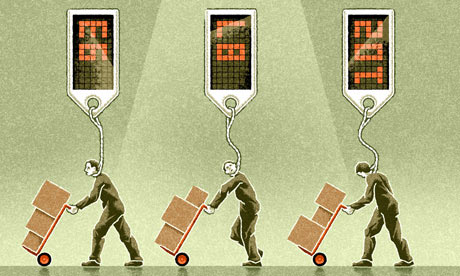New evidence coming to light in the National Archives and the Bodleian Library may soon change our entire view of the British slave trade, and the roots of institutional plantation slavery in the Americas.
With luck it will help to vindicate the fathers of liberal government and the free market in the 17th and 18th Centuries, falsely accused until now of abetting - or promoting - the great crime of race-based African slavery.
For academic orthodoxy holds that John Locke and the great Whig thinkers of the Glorious Revolution (1688) helped to design and foster the economic system of hereditary slavery that shaped Atlantic capitalism for a century and a half.
From that it is but a step to dismiss the moral claims of liberalism as so much humbug, to write off all the talk of justice, natural rights, inviolable contracts and government by consent as the self-interested catechism of oppressors. As Samuel Johnson said acidly: "How is it we hear the loudest yelps for liberty among the drivers of negroes?"
Except that this established version of events is not true. It is a near complete inversion of what happened, and this matters in all kinds of ways since the debate over slavery refuses to subside, even though the trade was abolished in 1808 and Empire slaves were freed in 1833.
Indeed, it is coming to the boil again. The Caribbean states, CARICOM, are filing a lawsuit against Britain, Spain, France, Holland and Portugal for slavery reparations. Apologies are not enough, says Ralph Gonsalves, premier of Saint Vincent. "We have to have appropriate recompense."
It matters too because liberal democracy has been on the back foot in large parts of the world for a decade. China is bidding for global leadership with radically different claims - with allies in Moscow, and followers from Bangkok to Caracas. It seizes eagerly on anything that punctures the moral claims of the West.
Joshua Kurlantzick says in Democracy in Retreat that the "Washington Consensus" we have known for so long is losing ground to an ascendant "Beijing Consensus", the greatest challenge to Western Liberal values since fascism and communism in the 1920s and 1930s.
The banking crash of 2008-2009 has tempted some in China's Politburo to conclude that Leninist planning is superior to Anglo-Saxon markets, and prompted many in Europe to ask whether Capitalisme Sauvage is worth saving at all. They misread events of course. It was governments that caused the crisis: the West by fixing the price of credit too low, the East by amassing reserves and flooding the world with excess capital. But that is not the narrative of the web, or political discourse.
So let us start to set the record straight on one point at least. The archives demonstrate that the Stuart monarchs Charles II and James II systematically drew up laws to enforce and spread hereditary slavery, mimicking the Spanish practice of the day and the "divine right" absolutism of the Habsburg empire.
They did so with relentless focus, stacking the courts to ensure favourable rulings, and carrying out police state sedition trials against opponents, not least because revenues from tobacco and sugar plantations became the chief source of wealth for the crown.
Professor Holly Brewer from the University of Maryland says Charles II was so enamoured with the Royal African Company that he engraved its symbols of elephant and castle on one side of his golden Guinea. "The Stuarts envisaged monarchy and slavery as, literally, two sides of the same coin," she said.
Slavery had not been hereditary in British possessions before. There were African slaves, just as there were indentured white workers, but it was fluid, in a legal grey zone, and judges could not be counted on to enforce the recapture of runaways.
Prof Brewer said the findings she has uncovered in the archives show that Locke fought tooth and nail to reverse this new hereditary structure while on the Board of Trade in the 1690s under William of Orange.
Locke sought the stop linking land grants to the number of imported slaves - 50 acres per head - a "strangely perverted "practice, in his words, intended to ensure a plantation aristocracy built on slaves. He urged that the children of blacks should be "baptized, catechized and bred Christians" so that they could not be denied their civil liberties so lightly.
Locke had been compromised earlier in the 1660s as a young man working for the Stuarts but later became an exile and rebel in Holland. "When he had a position of real power, he tried to undercut the development of slavery in comprehensive ways," she said.
His was the outlook of most liberal thinkers who shaped the American Revolution. It was the view too of Adam Smith, the free market theorist writing later in the 18th Century, also accused of promoting slavery. Smith, in fact, argued that slaverly stifled economic growth and innovation. “It appears from the experience of all ages and nations, I believe, that the work done by freemen comes cheaper in the end than that performed by slaves," he wrote in Wealth of Nations. William Wilberforce cited Smith approvingly to buttress the abolition case.
Locke's efforts to undo Stuart damage came too late. Vested interests were too powerful. Hereditary slavery had become embedded in the economic system of the American and Caribbean colonies. Britain would acquire the notorious "Asiento" at the Treaty of Utrecht in 1713, giving the South Sea Company the contract to supply the Spanish Empire with slaves. The cancer then metastasized.
In my view, the British are a little too cavalier about this saga, thinking the nation absolved because the practice was far away and not on island soil.
We tend not to be aware that King George III actively perpetuated the slave trade in the late 18th Century, vetoing laws by Virginia and other states trying to deter the inflow by raising import taxes on slaves. It is why Thomas Jefferson's original draft of the US Declaration of Independence contained a clause saying the king "has waged cruel war against human nature itself, violating its most sacred rights of life and liberty in the persons of a distant people who never offended him, captivating and carrying them into slavery in another hemisphere or to incur miserable death in their transportation thither. Determined to keep open a market where men should be bought and sold, he has prostituted his negative for suppressing every legislative attempt to prohibit or restrain this execrable commerce. And that this assemblage of horrors might want no fact of distinguished die, he is now exciting those very people to rise in arms among us."
And no, Jefferson was not a hyprocrite because he owned slaves. They were mortgaged, due to his family's crushing debts left from monetary deflation after the Seven Years War. They could not legally be freed.
America puts its own gloss on events. Simon Scharma argues in Rough Crossing that "theirs was a revolution, first and foremost, mobilized to protect slavery". His point is that the "Somerset" ruling of 1772 in England - "the state of slavery is so odious, that nothing can be suffered to support it: the black must be discharged" - set off ferment in the colonies, and the Dunsmore Proclamation in 1775 offering freedom to slaves who fought on the British side rallied planters to the revolution. Yet this can be pushed too far. The intellectual leaders of the American Revolution were Lockeans through and through, almost all tormented by slavery.
As Britain prepares to defend itself against the Caricom suit - so soon after settling torture claims from Mao Mao victims in Kenya - it is scarcely helps perhaps to argue that the slave system was built by monarchical tyranny, rather than by private citizens beyond control, as we like to think. It is worse, in some ways, if it was a state endeavour.
Yet it should be some comfort that Parliament and liberal government may be absolved, at least in part. Slavery was excresence of absolutism, not free commerce. We cannot hold our own in the world's bare-knuckled battle of ideas if we concede this cardinal point of history.



